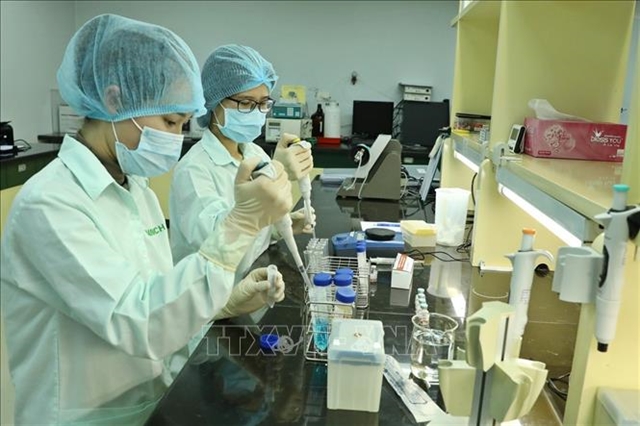 Society
Society

The ministry has worked with agencies to provide scientific information relating to the pandemic developments.

|
| Staff of the Vaccine and Biological Production Company (Vabiotech) test the amount of protein in the COVID-19 vaccine.— VNA/VNS Photo Minh Quyết |
HÀ NỘI — The Ministry of Science and Technology will continue strengthening research to serve COVID-19 pandemic prevention and control this year, especially researching and producing vaccines.
The ministry has worked with agencies to provide scientific information relating to the pandemic developments.
The ministry said from the very first days when the virus arrived in Việt Nam, the ministry worked with experts and scientists to research the epidemiology, virology and treatment regimen, including biological products for testing.
Soon, many sets of biological products were mass manufactured to serve pandemic prevention and control, the ministry said.
Next, the real-time reverse transcription-polymerase chain reaction (RT-PCR) kit, used to detect the SAR-CoV-2 virus, was made by Việt Nam Military Medical University in March 2020 and then put into mass production.
Lieutenant-General Đỗ Quyết, director of the university, said the RT-PCR kit was created thanks to efforts and the innovative spirit of both university’s scientists and Việt Á Technology Joint Stock Company.
Following the success, the university linked up with the Pasteur Institute in HCM City to shorten the time spent researching its Nano Covax vaccine. With the support of the institute, the research time was cut from six to three months, he added.
The first phase of the vaccination trial was conducted on December 17, 2020. The results of the first-phase trial of the Nano Covax vaccine showed the vaccine was safe and 90 per cent effective.
Quyết said the first trial vaccination injection of the second phase would be conducted on Friday, with the second trial vaccination injection at the end of March. The results of the second-phase trial would be revealed at the end of April.
The number of volunteers who registered to be given Nano Covax in the second phase of the trial has reached nearly 1,000 so far.
If the results met requirements on safety and immunogenicity, the third phase of the vaccination trial would start in early May, he said.
The vaccine’s third-phase trial needs 10,000-15,000 volunteers and the selection of participants would be expanded to ensure a broad-spectrum target for vaccination, he said. — VNS




